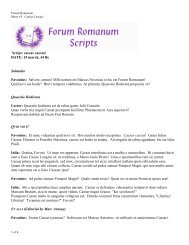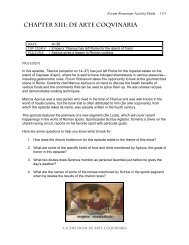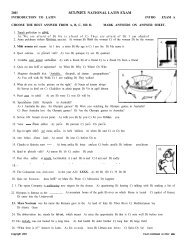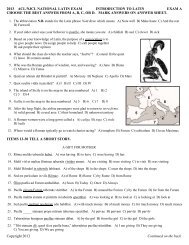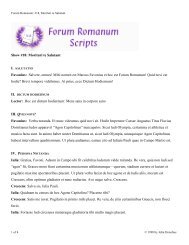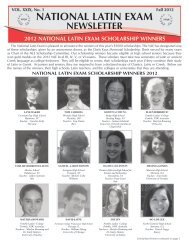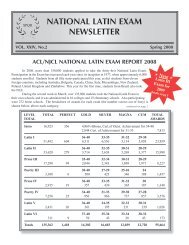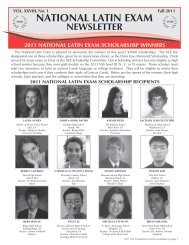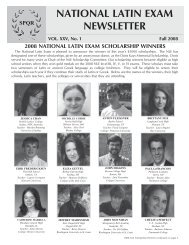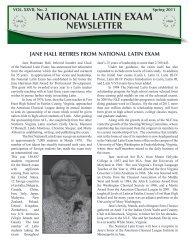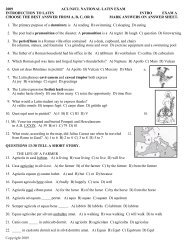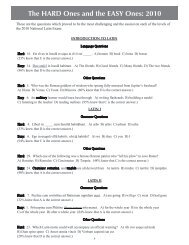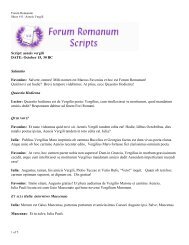2011 Intro Latin Exam - The National Latin Exam
2011 Intro Latin Exam - The National Latin Exam
2011 Intro Latin Exam - The National Latin Exam
You also want an ePaper? Increase the reach of your titles
YUMPU automatically turns print PDFs into web optimized ePapers that Google loves.
A LETTER TO CORNELIUS PRISCUS<br />
Pliny the Younger Comments on the Death of the Poet Martial<br />
Audiō Valerium Martiālem dēcessisse et molestē ferō. Erat homō ingeniōsus, 1<br />
acūtus, ācer, et quī plūrimum in scrībendō et salis habēret et fellis nec candōris 2 salis = of wit; fellis = of bitterness<br />
minus. Prōsecūtus eram viāticō sēcēdentem; dederam hoc amīcitiae, dederam 3 prosecūtus eram = I had seen him off; viāticō = money for<br />
etiam versiculīs, quōs dē mē composuit. Fuit mōris antīquī eōs, quī vel 4 travel<br />
singulōrum laudēs vel urbium scrīpserant, aut honōribus aut pecūniā honōrāre; 5<br />
nostrīs vērō temporibus, ut alia speciōsa et ēgregia, ita hoc in prīmīs exolēvit. 6 speciōsa = beautiful; exolēvit = has fallen out of fashion<br />
Nam postquam dēsiimus facere laudanda, laudārī quoque ineptum putāmus. 7 dēsiimus = we have ceased; ineptum = out of place<br />
Meritōne eum, quī haec dē mē scrīpsit, dēfūnctum esse doleō? Dedit enim 8 Meritō = Deservedly; dēfūnctum esse = has died<br />
mihi, quantum maximum potuit, datūrus amplius, sī potuisset. Tametsī, quid 9 Tametsī = Although<br />
hominī potest darī maius quam glōria et laus et aeternitās? At nōn erunt aeterna, 10<br />
quae scrīpsit; nōn erunt fortasse, ille tamen scrīpsit, tamquam essent futūra. Valē. 11<br />
Pliny the Younger, Epistulae III.21<br />
21. What is the best translation of dēcessisse (line 1)? A) is dying B) has died C) would die D) will die<br />
22. According to line 1, how does Martial’s death affect Pliny? A) he is indifferent B) he is upset C) he is surprised D) he is delighted<br />
23. What figure of speech is illustrated by ingeniōsus, acūtus, ācer in lines 1-2? A) asyndeton B) metaphor C) interlocking word order<br />
D) antithesis<br />
24. What type of clause is quī...habēret (line 2)? A) indirect command B) indirect question C) result clause<br />
D) relative clause of characteristic<br />
25. What figure of speech is illustrated by nec candōris minus in lines 2-3? A) simile B) zeugma C) litotes D) anaphora<br />
26. In line 3, sēcēdentem refers to A) money B) Pliny C) friendship D) Martial<br />
27. What is the literal translation for Fuit mōris antīquī (line 4)? A) <strong>The</strong> customs are old B) <strong>The</strong> ancients had a custom<br />
C) It was of ancient custom D) <strong>The</strong> age of the custom was<br />
28. In lines 4-5, eōs refers to poets who had sung the praises of A) honor and glory B) money and gifts C) individuals and cities<br />
D) war and peace<br />
29. In line 6, Pliny comments upon the loss of A) his close friend B) his investment in literature C) a memorable poet D) bygone customs<br />
30. To what does the hoc (line 6) refer? A) recognizing poets for their work B) the early works of Martial<br />
C) his sadness over Martial’s death D) time to enjoy the works of poets<br />
31. What is the best translation of laudanda (line 7)? A) praising things B) to have praised things C) things to be praised<br />
D) things having been praised<br />
32. According to line 7 (Nam...laudanda), Pliny feels that people A) are too busy to enjoy poetry<br />
B) envy the accomplishments of others C) should praise him for supporting literature D) no longer do praiseworthy things<br />
33. According to line 8, Pliny asks whether Martial deserves A) a poem in his honor B) to have a commemorative statue<br />
C) Pliny’s friendship for him D) Pliny’s grief for him<br />
34. According to lines 8-9 (Dedit...potuisset), Pliny states that Martial A) offered him as much poetry as he was able to write<br />
B) made up most of what he wrote C) wrote a vast amount of poetry D) would sometimes write insulting poetry<br />
35. To whom or what does datūrus (line 9) refer? A) Martial B) Pliny C) praise D) poetry<br />
36. What is the best translation of sī potuisset (line 9)? A) if he is able B) if he was able C) if he should be able D) if he had been able<br />
37. According to lines 9-10 (quid...aeternitās), Pliny feels that A) nothing is greater for men than lasting fame<br />
B) in time people forget praise and glory C) a man’s generosity will be praised forever D) eternity will be the judge of men’s<br />
accomplishments<br />
38. According to lines 10-11 (At...scrīpsit), Pliny states that Martial’s poetry A) is not worthy of praise B) will not last forever<br />
C) will not appeal to everyone D) is too difficult to understand<br />
39. According to lines 10-11 (At...futūra), Pliny thinks that Martial A) did not care what people think<br />
B) wrote as if his poetry would last forever C) wrote about the future D) would bring a return of the old customs<br />
40. In this letter Pliny makes the point that A) poetry is less honored than in previous ages B) too much praise is given to poets<br />
C) death ends a poet’s honor D) only practical things deserve praise<br />
Copyright <strong>2011</strong>



